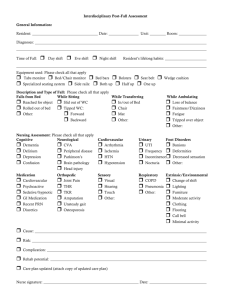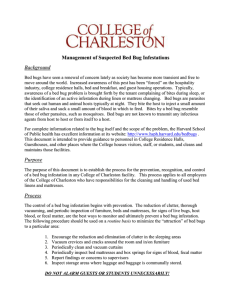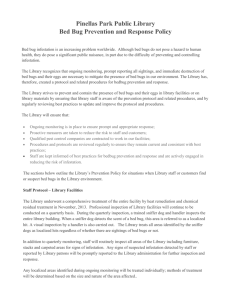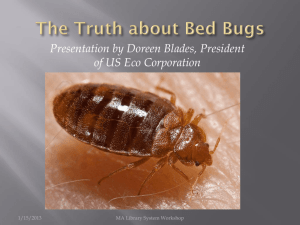Sleep Tight and don*t let the bedbugs bite
advertisement
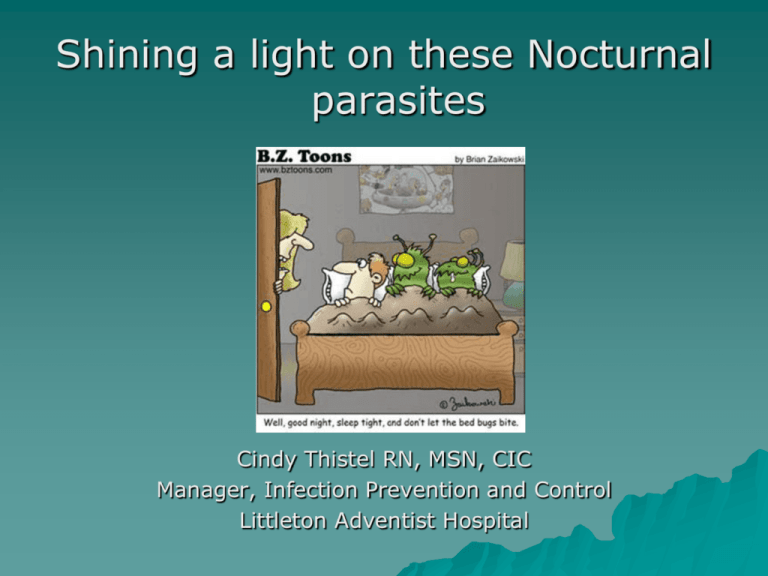
Shining a light on these Nocturnal parasites Cindy Thistel RN, MSN, CIC Manager, Infection Prevention and Control Littleton Adventist Hospital Purpose As an emergency first responder, bed bugs are part of your future. – Infestation is on the rise in the U.S. and – EMS personnel need to know about bed bugs to avoid picking them up on clothes and transporting them We will explore – Key facts about bed bugs – Become familiar with what they look like in a variety of environments – How can we focus on patient care and still protect EMS personnel from picking them up? – How do we keep emergency medical facilities and transport vehicles from becoming infested? Where did the saying come from? One theory…..Mid 1600's, the Spanish settlers of St. Augustine Florida made their beds from a wood frame with rope crossing the frame to hold the mattress. Their bedding was stuffed with moss and other plant materials that had bugs in it. Therefore, it was very common to get bitten by bugs when you were asleep in your bed.... Hence, "Good night, sleep tight, don't let the bedbugs bite....” Why Resurgence? Exact cause not known… Experts suspect the resurgence over last 10 years is associated with… – Increased international and domestic travel – lack of knowledge necessary to prevent infestation – Increased resistance of bed bugs to pesticides. – Currently no OTC pesticide that kill bed bugs What is being done about the resurgence? CDC, EPA, and other federal agencies are working closely with state, tribal and local health departments, academia and private industries to monitor and better understand the recent resurgence in communities throughout the U.S. – CDC partnering with experts in areas of medicine, entomology, epidemiology and environmental toxicology to better understand resurgence and the methods and tools needed for control – EPA’s primary responsibility is to ensure the safety and effective use of pesticides – Other federal agencies such as HUD are involved in research and education about bed bugs. Public Health Departments provide education on prevention Top 10 Bed bug infested Cities in North America? In early July 2010, Insight Pharmaceuticals, makers of Pronto Plus, an over-the-counter bedbug insecticide, wrote that Denver was sixth on the list! Sept 2010 - Denver Public Library had to destroy 31 rare books that were hundreds of years old after a recent infestation. – Had to fumigate four areas of its Central Library What are bed bugs? Blood-feeding insects that prefer human blood Do not transmit or spread disease Usually feed every 5-10 nights (young 3 min & adults 10-15 minutes) Adults are 1/4” long, flat, oval, and have no wings Lives about 1.5 years Generally brown in color except after a blood meal. Eggs are about 1/25th” long Fastened to cracks, crevices or rough surfaces The eggs hatch in one to three weeks. What are bed bugs? Bit is usually not felt - as they feed they inject an anesthetic and anticoagulant into their victim. Injected fluid often causes the skin to itch and become swollen. Scratching causes sores which may become infected. Most infestations are only noted after bites appear. No bites Doesn’t Necessarily Mean No Bugs Study showed bites are NOT a good early indicator – Introduced each of 900 volunteers to 1 to 3 bed bugs from a lab colony for a feeding Almost immediately, 3.7% reacted with mild to serious skin irritation Within 18 days, an additional 0.8% exhibited some level of reaction – Total was only 5% reacted – Elderly have diminished response to skin irritants-less likely to exhibit a reaction Why do they like us so much? We have less hair than most mammals. Heat – Our bodies emit it. Carbon Dioxide – We exhale it. Perspiration – Still unclear but it’s believed that there may be a compound in our perspiration that attracts bed bugs. Why do they like us so much? We’re Convenient - Human dwellings and gathering places give bed bugs a perfect combination of a….. – Reliable and convenient food source – cooler spots nearby to live and hide such as Mattresses Box springs Behind wooden headboards & Pictures Couch cushions Furniture Carpet Baggage Boxes Clothing Wall paper Where can you find them? Their presence is NOT an indication of socioeconomic level or hygiene … can happen to anyone! VERY successful at hitchhiking and hiding. Most hitchhikers are females. Hotels, Theaters, Apartments, Homes, Cruse ships, Airlines, close sleeping quarters Can be located in any area of your home, but they are most commonly found close to their host within 8 feet Resilient - can survive for 10 months to a year without feeding. Where can you find them? Knowing What to look for is the 1st step? Fecal Spots – Dots of dried blood along mattress seams, the box spring, behind the headboard, or anywhere else bed bugs harbor Knowing What to look for is the 1st step? Cast Skins–These appear to be hollowed out bed bugs and are the sheds from the nymphal stage Eggs – About 1mm long and rice shaped these can be difficult to see Severe bed bug infestations tend to have a sweetish, foul odor which is caused by an oily liquid they emit. Mattresses Carpet Infestation Furniture Infestation Under Picture & Wall socket Preventing Home Invasion Think twice before combing the alleyways and resale stores for a bargain. Check second hand furniture before bringing home Use a protective cover to encase your mattress and box springs. Eliminates hiding places by reducing clutter May need to dispose of items Preventing Home Invasion When traveling: –Hotels: Use luggage racks to hold luggage rather than setting on floor or bed Check the mattress and headboard before sleeping Upon returning home – unpack directly into the washing machine – Inspect your luggage carefully Prevention is Important Presence of bed bugs is not an indicator of poor sanitation… BUT……..pests of any kind are accompanied by perception of being “dirty”. Can damage a reputation! Prevention is the key to avoiding bed bug problems, therefore we need to be proactive to keep them from entering our transport vehicles and facilities. Acute Care Hospitals are a Less conducive environment for bed bugs….. Quick patient turnover Clinical beds have metal frames (no crevices). Plastic-covered mattresses and pillows prevent bed bugs from reaching porous areas to live in. Ripped and torn mattresses must be replaced IMMEDIATELY! Acute Care Hospitals are a Less conducive environment for bed bugs….. Stringent cleaning practices create a hostile environment for pests and is most likely to keep them from spreading to other rooms. We routinely place a patient belongs in a plastic bag. Can happen more easily in maternity, hospice, long term patient care and psychiatric units – Why… they are more likely to bring luggage, bedding and other personal effects and stay a longer period of time How can we focus on patient care and still protect EMS from picking them up? Your Role….avoid picking up bed bugs and transporting them Wear simple clothing – Avoid shirts with buttons and pockets – Avoid pants with cuffs, cargo pockets and multiple zippers – Simple shoes with minimal threads (can be put in hot dryer) Tuck pant legs into your socks or boots How can we focus on patient care and still protect EMS from picking them up? When entering an establishment, have a team member on bed bug alert If bug evidence is found have a code word to warn colleagues. Have large plastic bag available to put on floor to kneel on for patient care Set all equipment down on the plastic How do we keep facilities and transport vehicles from becoming infested? Always avoid placing your medical bag on upholstered furniture, bedding or on carpeted floors. If you think your equipment has been infested you can bag it in the plastic bag on the way out for later cleaning How can we focus on patient care and still protect EMS from picking them up? Avoid using the patients' own sheet as a sling to move patients Have plastic sheeting or body bags in vehicle Do not transport the patient’s bed linens If obvious infestation, put on bunny suit and put clothes in plastic bag before entering cab Bag all equipment that went into home in plastic and tie off. If any Suspicions??? Communicate suspicions to ED Clean and disinfect ambulance. Observe for bed bugs Open any equipment you bagged, inspect for bed bugs and disinfect If any Suspicions??? Place all patients clothes and belongings in plastic bag and send home with family – Clothes must be placed in hot dryer for 30 min….including shoes – Family can inspect personal belongings carefully for bugs Have Patient shower and provide fresh clothing. Place them in a another clean room and Close off original room. Have ES inspect closed off room Detection: May need to call in a Professional Bed Pest bug detecting dog Management Professional Getting Rid of them? Call in a professional if your not sure. Professionals have chemicals, High heat and freezing methods. If in mattress, soft furniture or carpet… vacuum then steam clean For clothing that can take the heat, launder in HOT water and dry in dryer. Combo of heat and soap will kill the bugs and remove eggs. Otherwise dry cleaning. Wash down walls/crevices and floors with 91% isopropyl alcohol (spray bottle) Questions? KNOW THE ENEMY Bed bugs leave tell-tales signs such as blood stains near the bite site. Dark deposits (fecal spots) occur on sheets, mattresses and & walls In severe infestations, a sweet, musty odor from the insects’ scent glands may be present. Sleep Tight, Don’t let the Bed Bugs Bite!



